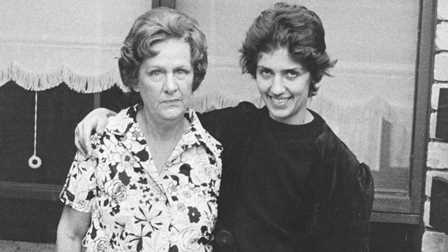Margot Nash and her mother Ethel.
How did you come to make The Silences?
I wrote it as a feature drama. The story was something I really wanted to tell. I had done two feature dramas, so I wrote a script, but it was really expensive and it was really hard to get made and I just put it away. [But] It just wouldn't go away. It was this thing that kept nagging at me. I thought: can I tell it as a documentary? I got a filmmaker residency in Zurich in 2012. It was a fourteen week paid residency where I could work on a project. I had to give some masterclasses but I had a lot of time. I suddenly had this brainwave. I've been making films since the 1970's, and I've often drawn on my story to create images or construct characters. I'd literally re-created some images from my childhood in my feature film Vacant Possession, which starred Pamela Rabe, which I made in the 90's. I'd based the father, played by John Stanton, on my father. So it was a bit of an experiment, because I just went away and took everything with me and taught myself Final Cut. I came back after the fourteen weeks and I had a cut. I thought, it needs a lot of work, but there's a film there.
What were some of the difficulties making a memoir film?
The story's intensely personal. I stayed away from the funding bodies and did it slowly and quietly, because I just needed to have a long slow process. I didn't want to be pushed into fitting into slots or pleasing other people. Telling a personal story is quite confronting, and I also had to be sure that I had a film that might speak to other people. It creates the space for other people. It gives people permission to speak about some of those traumatic things that aren't spoken about. The film is about family trauma, and the things kept silent, and one of those things was [that] my father was mentally ill. There were two big secrets. I didn't know Dad was mentally ill until I was 10, because I just thought all families were like that. My sister had to tell me, because things got out of hand. The other story, which was a big secret in the family, was what I really wanted to tell, because it had never been told. That's why it's called 'The Silences', because it's about all the hidden secrets.
How did the film evolve after you came back from Zurich with a rough cut?
I showed it to a lot of people and got a lot of feedback, and the big thing that changed was the structure. When you do a memoir film, suddenly it starts to look like Who Do You Think You Are? You start getting caught up with great-uncle Frank who's sailed the seven seas, and no-one cares. So I had to strip away a lot of research I'd done about the family. I really struggled with the structure, because I didn't want it to be chronological. I went to a wonderful screenwriters conference in Wisconsin a few years ago, and heard this American screenwriter called Larry Gross [48 Hrs]. He gave this great keynote called The Watergate Theory of Screenwriting. With Nixon, it was: what did the president know and when did he know it? [In screenwriting] it's about what does the audience know and when do they know it? What do the characters know and when do they know it? He had a beautiful example of a Kurosawa film called Ikiru. We find out that the protagonist is dying of cancer in the first second, but he doesn't know, and then when he finds out, he doesn't tell people. In The Silences, not telling the story chronologically created suspense and it really cracked the structure. Then I could thematically construct the film and make big leaps across chronology, and then return later to unfold that secret story.
What's the reception been like?
The first screening was at the New Zealand International Film Festival. Half the film is set in New Zealand. My sister's in Auckland. The first screening was a bit weird. My sister had got a lot of people to come, and then it was really hard for her, because it is our family. She'd seen it many times, but then it's so personal, so we had to go back and do some more work together on coming to agreement about how it might be screened and when. I was fine up until then, then I got upset, now I'm okay about it" [laughs]
The Silences is launching April 27 at Sydney's Cremorne Orpheum, followed by a Q&A.
From April 28 onwards, the film screens at the Orpheum and Cinema Nova in Melbourne, followed by The Arc in Canberra on the 29th, Newcastle's The Regal on the 30th, and several screenings at Adelaide's Mercury from May 10.
ACMI is doing a retrospective of Margot Nash's work on May 18, and Sydney's Golden Age Cinema is screening the film on May 22.


